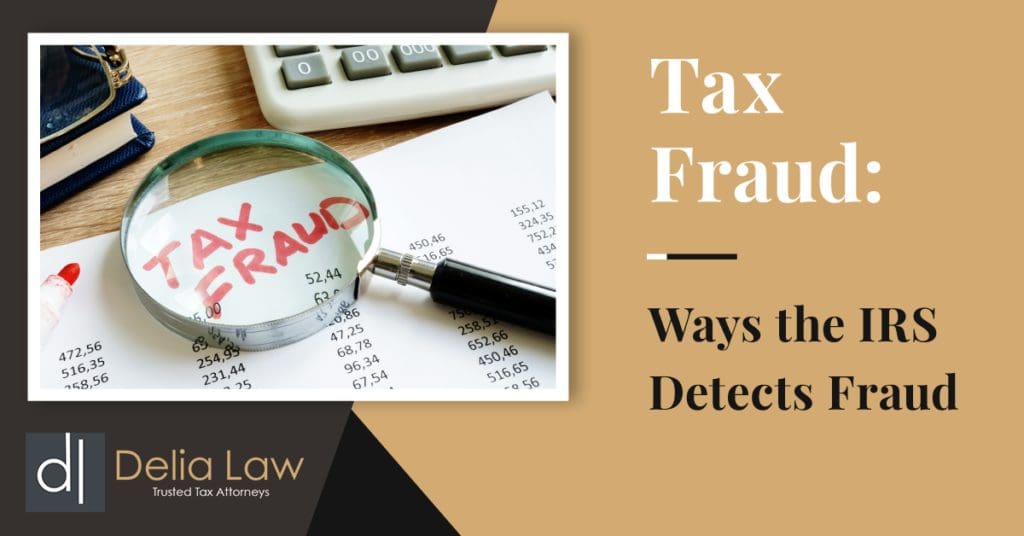That’s the latest IRS tax gap estimate.
The IRS tax gap is the difference between the amount of tax the government believes it should collect and the amount of tax actually collected. That’s a large gap!
Whether (1) illegally obtaining a relief loan under the Coronavirus Aid, Tax Relief, and Economic Security (CARES) Act, (2) intentionally failing to report income (especially Cryptocurrency) (3) failing to file accurate tax returns (3) to fraudulently claiming tax-deductible expenses, taxpayers can risk civil and criminal penalties for their actions.
To help you avoid any serious tax issues with the IRS, we’ve put together this quick guide highlighting four ways the IRS can detect fraud.
1. IRS Information Returns
One way the IRS detects fraud is by requiring and processing Information Returns with computer data analysis tools. These returns allow the IRS to match what individuals report on their tax returns with the information their employers and other third parties report.
More specifically, the IRS analyzes the information from three different sources:
- W – 2 Form
Employers who operate a business or engage in trade and pay a wage to employees in exchange for their services are legally required to file a W – 2 form for each employee and report their incomes. You’ll find more information about form W – 2 on the IRS official website.
- 1099 Form
Any non-employment income must be reported to the IRS using the 1099 form. Whether you’ve received dividends, or received unemployment benefits, interest or are a freelancer/independent contractor, you need to report this income. Note that depending on the nature of your non-employment income, you’ll have to use a different version of the 1099 form. For example, independent contractors are required to report earned income of $600 or more on a form 1099-NEC. You can find more information here.
The Schedule K-1 form allows you to report your income and expenses from S corporations, partnerships, trusts, and estates.
Once the IRS has received K-1 information from third parties, it then finds the individual’s tax return to ensure the information matches what they have reported as their total income.
In addition, the IRS uses fraud detection filters to detect and stop fraudulent returns claiming the earned income tax credit (EITC). In fact, for the Fiscal Year 2020, the IRS reported stopping over 591,000 fraudulent returns and preventing the payment of over $3 billion in incorrect refunds.
Yet, this is just the tip of the iceberg. The IRS computer’s capabilities have been enhanced over the last few years, leveraging the power of digital technology, big data, and artificial intelligence. (AI). Thus, the IRS relies on advanced behavioral and statistical algorithms to identify patterns and detect non-compliance.
They can also track your emails, credit card/bank account transactions and even medical records!
Thus, it is imperative to contact a tax attorney before getting too creative on your own or with your CPA…or deciphering sometimes extremely complex tax responsibilities. An experienced tax attorney can assist with IRS compliance, while maximizing tax benefits with what is allowable under the IRS Tax Code.
2. Social Media Activity
One of an IRS employee’s prerogatives is to search for publicly available information about a specific individual taxpayer or business. Therefore, they can review publicly available social media information to assess whether someone might be cheating.
But how does the IRS use social media to identify tax cheats?
Social media is an excellent way for IRS agents to detect fraud because it allows them to identify gaps between someone’s lifestyle and the amounts reported on their tax return. And it can also help them spot fraudulent tax deduction claims.
For instance, let’s say you claimed that you went to Japan for business this year. You claimed your flights, hotel nights, and meals. Yet, your social media account shows you were traveling with your family and enjoying family-related activities. This clearly indicates you lied about traveling for business purposes, and you’ll likely be fined and requested to pay interest which often leads to additional tax penalties. Or perhaps you just posted a photo of your brand-new boat when you reported very little income. These are red flags IRS agents can spot.
3. Informants and Whistleblowers
A resentful ex-partner, friend, or employee could tip off the IRS about fraudulent personal or business deductions, underreporting of income, or illegally obtaining a tax relief loan. In addition to these informants, the IRS also implemented a financial reward system to encourage whistleblowing.
More specifically, based on eligibility, the IRS pays monetary awards corresponding to between 15 and 30% of the amount recouped, thanks to the informant’s information.
Since the Whistleblower Office was created in 2007, it has effectively awarded over 2,500 whistleblowers, approximately $1 billion in payments. The information provided by these whistleblowers allowed the IRS to recoup $6.39 billion in tax, making the program one of the key tools for the agency to detect fraud and collect money from non-compliant taxpayers.
You can also report suspected tax fraud activity to the IRS with IRS Form 3949-A.
4. The Office of Fraud Enforcement (OFE)
In September 2020, the Office of Fraud Enforcement was established to support the agency’s efforts to crack down on fraudulent activity. A team of highly trained fraud enforcement advisors was hired to help detect fraud during audits and review potentially fraudulent claims.
Some of the critical aspects the OFE works on include the following:
- Improving fraud detection when it comes to areas with a high risk of fraud.
- Fostering internal and external partnerships to improve enforcement.
- Working in partnership with the IRS Criminal Investigation (IRS-CI) and referring cases when the probability of fraudulent activity is high for potential prosecution.
- Training IRS agents to help them identify signs of fraudulent activity early on.
IRS Increasing Fraud Efforts
As we increasingly shift towards a digital society and technology advances, the number of tools in the IRS’s arsenal to fight fraud is rapidly growing, allowing IRS agents to better identify non-compliance.
The IRS’s efforts should start paying off soon and help the agency close the tax gap, with the investment projected to help the agency generate over $200 billion in revenue between 2022 and 2031.
Just in the last month, our tax attorneys have seen an impressive increase in IRS tax audits and civil and criminal investigations. The IRS is definitely on the hunt.
How Can Delia Law Help You?
At Delia Law, we assist taxpayers solve any IRS-related tax issues. Leveraging years of experience in the tax field, our highly talented tax attorneys are adept at providing every client with a highly tailored service. They’ll be able to help you on many fronts, from minimizing your individual and businesses’ back taxes, preparing and filing unfiled tax returns to settling tax debt or appealing an IRS decision.
We thrive on challenging cases and are determined to obtain the best results for our clients.
Do not hesitate to get in touch and request a free consultation. We’d be happy to discuss your needs and see how we can help.










